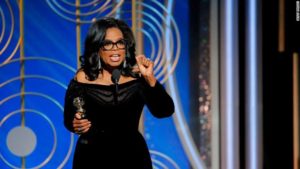by Anu Sawhney
This weekend, while watching the Golden Globes, one which left most awestruck by Oprah Winfrey’s fiery acceptance speech, it was another – some might say less glamorous – speech that left me overwhelmed by its importance and clarity. Sterling K. Brown, the star of the NBC series This is Us, made Golden Globe history in becoming the first-ever black actor to win the award in the Best Actor in a TV Drama category. In thanking the creator of the show, Dan Fogelman, he explained how Fogelman “wrote a role for a black man that can only be played by a black man. What I appreciate so much about this is that I’m being seen for who I am and being appreciated for who I am, and it makes it that much more difficult to dismiss me or dismiss anybody who looks like me.”
Herein, I believe, Brown was able to articulate the key to authentic representation on screen. At a time when the most powerful women in the industry wore black in solidarity with those who were silenced by their assailants, I cannot think of anything more important than ensuring that no one feels like their identity is something that can be dismissed. While we can sit here at the precipice of a what feels like a new era and view the MeToo movement as a product of important progress, intolerance, and recognition of the importance of reclaiming our bodies, I’d be one to argue that it is far too little for us to move forward as a society where no one – and I mean no one, is left behind.
As a disabled woman of color, with every “first-ever” moment I can feel my heart race at the ordeal, because somewhere in my mind this means that Hollywood – and, by extension, society – is normalizing diversity and change. And there are strides of progress that have been significant, not only for women but also for women of color. Somehow, though, almost every mainstream conversation in regard to diversity manages to leave out an important minority. 19% of Americans are people with disabilities, making us the largest minority group there is, yet somehow a latent issue outside of activist circles and sometimes, politics. On screen, disabled characters are almost always played by able-bodied actors who are awarded for portraying a disability as a costume that one can simply wear on screen or learn about through others who’ve lived with the disability for a long enough time – only to return to an able-bodied lifestyle. All of those things will remain true as long as roles aren’t given to actors in the way that, as Brown explained, doesn’t allow for the dismissal of the actor’s whole, intersectional identity.
What makes this dismissal harder to accept in the year of the MeToo movement is the findings of a recent NPR study, which shows that people with intellectual disabilities are seven times more likely to be assaulted than people without a disability. Not only is this an epidemic, the victims are described as “easy targets” and it is largely underreported, especially among women who live in group homes. We cannot seriously be having a national discussion about changing mindsets or having a cultural reckoning if we’re not giving the group who have the most to win or lose a seat at the table. This would be a disservice to the victims who have been brave enough to come out, voice their stories to all those they have paved the way for, for whom the movement is created – including the most vulnerable. The harder we are to dismiss, the more important it will be for our voices to be heard.

